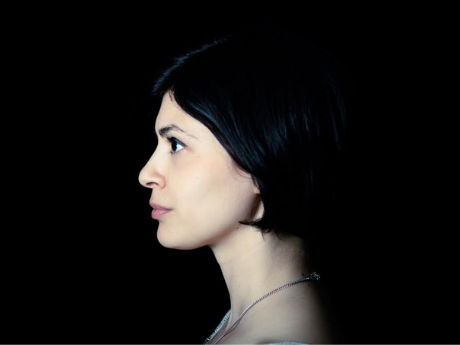In Their Own Words
Natalie Eilbert's “Imprecation”

Imprecation
Balm of fallen girls, balm of dog bladder
loose from its body. I kept you like
a smuggled feather, the journey
vast and untelling. I had a wife, thrown
broken crystal at my feet. Balm of homely
deer-gods, cold smoke of the tribe
that made you, that sculpted you stone
over beveled stone. I had a mother
whom I loved for your likeness—
buxom, tearing at the seams.
Like you she watched my declension
not unkindly. Like you she found
edges and stayed just there. Balm then
of fixed skin. The spine able to love
able to snap like safety and undo
all signs of breath, my dumb privileges.
I made a list of pets sacrificed
over the course of a thousand years,
none told in your name. I had a wife
made of stitches, worms curled
in the seams, and you were a footnote
to artifact, my broken legs and arms.
Balm of coconut for the stretch marks
on my buried dogs. I had a city of limestone,
your body collecting as we drank
rainwater, the nerves in our throats.
I had a spell for all comers
they made flint replicas of you
they gave you eyes and you watched them
marvel you watched them drown
and gouge and smother each other.
I had a city of women, we practiced
self-immolation we practiced kissing
the men who would finish us.
I had a city made I had a city.
From Swan Feast (Coconut Books, 2015). All rights reserved. Reprinted with the permission of the author.
On "Imprecation"
The word was first introduced to me in a workshop by the brilliant poet, Dawn Marie Knopf, and it means a spoken curse. It was irresistible as a conceit, but I didn't touch it for years. Imprecation. I grew up sealed shut, ashamed of my body, ashamed to speak. From imprecari, to invoke, call down upon. At a very young age, my body was taken from me, replaced with this wretched premature woman shape I never wanted to consider. I thought for long periods of my life I could rely on what I didn't say about my history, and then on what I might embellish about that history. I embellished or omitted details to hide, to survive. What did I want to consider mine in this world, I didn't know. When I moved to New York City for grad school, there was something that broke open in me—the city can give us the sense of control as it wrests certainty; it demands visibility through invisibility; it relies on urban development and planning but seems to prefer rupture. As someone who has always had crippling depression, the city's contradictions were a special comfort. Baudelaire said, "Everything becomes an allegory for me," and I think in how the city erased me and how I erased myself, I took in the city as my allegory.
I read Jane Jacobs and Walter Benjamin for years, and so I was digging into these two minds to get a greater scope of The City as an organism and allegory and IRL agony. My book, I knew, was going to be about the "Venus" of Willendorf, but the city—and my desires for an alternative reality—felt like something I could reclaim and repossess as an ancient cosmopolis. I could give the city the Calvino treatment, create a city with such a dictum: "the foreignness of what you no longer are or no longer possess lies in wait for you in foreign, unpossessed places." The foreignness of what you no longer are, I wanted to build that.
In the heat of all this thinking, I experienced the Punchdrunk production of Sleep No More where literally the only way to interact with the world was behind a mask. I felt performance immersion and I left with glass teeth and a sweaty brow, exhausted, energized, fucked every way. I looked up the eponymous Macbeth passage and came upon this curse: "The death of each day's life, sore labor's bath, / Balm of hurt minds, great nature's second course, / Chief nourisher in life's feast." I kept misreading "course" for "curse" and thought back to the word. "Balm" implied so much, a cure-all, an unguent, a secretion. I thought of my hurt mind, what more I could squeeze from it. The memory of watching a feather fall from a bald eagle and thinking it a small bird, smuggling it onto a boat, and brushing it across my cheek. The memory of finding gutted strung deer in the yard and regarding her slack wet tongue. The memory of accidentally unburying a desiccated corpse of a three-legged dog while digging in my backyard. The memory of seeing photos at the MoMA of women self-immolating and crying for weeks in my shoebox apartment for even thinking I deserved unburned skin. I synthesized it all into a spell for the "Venus" of Willendorf and our city, but it became a curse. Do not touch my hurt mind, the poem warns, I am from no city.


